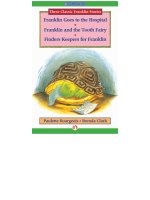Arthur slade THE HUNCHBACK ASSIGNMENTS 01 the hunchback assignments (v5 0)
Bạn đang xem bản rút gọn của tài liệu. Xem và tải ngay bản đầy đủ của tài liệu tại đây (861.55 KB, 161 trang )
FOR TORI,
with all my love
PROLOGUE
The Foxhound
SIX HUNTING HOUNDS HAD PERISHED in previous experiments. Dr. Cornelius Hyde crouched in the cellar of his
manor staring over his spectacles at Magnus, the last surviving hound. The iron cage was sturdy, its door locked
tight, and the dog looked healthy except for his drooping head. He had survived the operation that replaced his
skull, jaws, and teeth with metal, but the weight of it all was too much for him to bear for long periods of time.
He needed strength and ferocity. Soon, Hyde hoped, these needs would be dealt with.
Hyde opened a hatch at the top of the cage and carefully attached a coiled wire to each of the bolts that
extended out of the hound’s shoulders. The dog didn’t move. The doctor then connected the wire to a gyroscope
sitting on a broken chair.
Hyde sat in another chair at a table. His smooth, ink-stained hands trembled as he jotted down: March 7, 1860,
7:35 p.m. Trial 7. He felt certain that this time the elixir would have the desired e ect. He hadn’t slept or washed
in days, having spent every hour measuring the elements precisely, mixing them, and boiling the compound in a
glass beaker. He didn’t wish to see his favorite foxhound su er with the same tremors and terrors that had
consumed the other hounds as they succumbed to a slow, contorted death.
Hyde spoke hoarsely. “You are a good companion.” Magnus raised his head with some e ort and wagged his
tail. His master winced and ran a hand through his graying shock of hair. It had been months since he’d had it
cut. “This is for science,” he explained tenderly. “Science. Mother Nature’s design has failed you, but mine will
not.”
Magnus went on wagging. He was nine years old. His back was lean and well muscled, his front legs as straight
as posts. The dog had always been loyal and even-tempered; not once had he snapped in anger. He had hunted
alongside Hyde in the days when the doctor needed to feign interest in such folly in order to procure funding from
lords and gentlemen. Their contributions enabled him to continue his research. Those days were well past.
The members of the Society of Science in London now treated him with scorn, accusing him of madness and
tampering with the natural order, as though changing a creature’s chemistry and structure for the better was
something beyond evil. Scientific heresy! they’d shouted. They cut o his funds. Half the scientists were members
of Parliament. They convinced the government to declare his experiments a crime. A crime! The thought of those
fat, arrogant politicians debating the value of his work enraged Dr. Hyde. He pictured them voting to outlaw his
experiments, the Society of Science dullards nodding their heads.
“Fools!” he whispered. “Stupid, mindless fools!”
A few days after the vote, constables kicked open the door to his city home and con scated most of his
equipment. He ed to his country manor to conduct his experiments in the cellar. He scrounged for funds and
was reduced to using the last of his inheritance and his remaining few beakers and compounds to carry out trials
upon his own animals. Soon he would be dragged away to debtor’s prison.
Above him the oorboards creaked. He listened intently, ears buzzing. Until recently he would have assumed it
to be his manservant, but Hyde had dismissed him a fortnight earlier. Could it be a constable? He waited for a full
minute,
changed.
nally deciding the sound was only the shifting of the house. It grumbled every time the weather
Hyde picked up a ask of bloodred liquid from the table, the burned almond smell making him cringe. He’d
been working on this tincture now for seven years. “For the sake of knowledge,” he said to the air.
He carefully lled the bowl in the cage. The hound stared at his master, his neck even weaker from the weight
of his metal head, his tail limp.
“Go on, Magnus,” Hyde urged, his heart near breaking. “Drink. Drink your medicine.”
But the dog wouldn’t move. Hyde couldn’t help wondering if Magnus knew he was in danger. Over the past few
weeks his keen ears had surely picked up the agitated barks, unearthly howls, and final whimpers of his brethren.
Did he understand that he would be next? For a long time the dog watched Hyde, though he could barely hold his
head up. He began lapping the tincture, his pink tongue rubbing on metal teeth. He kept his eyes on Hyde. The
doctor swallowed hard, bile in his throat.
Beside him on the table was a clockwork model of a hound, about one-sixteenth life-size. He patted it and gears
clicked and spun. The metallic dog wagged its tail. Hyde smiled; imagine what he might create if he could only get
his hands on the proper resources!
He reached for his quill and notebook. The dog grimaced and revealed silver teeth. His head was higher now.
For the
rst time ever Hyde heard the sweet-natured dog growl. Magnus’s head jerked from side to side, as
though he didn’t recognize his surroundings. His attention settled on the cage’s hinges and locks, and he attacked
them again and again. Sparks ew, metal bent, and Hyde stepped back. He crouched, ready to run, but the cage
was holding together.
Under the gaslight, the doctor wrote copious notes, dipping his quill frantically into the inkwell. He was so
absorbed in recording his observations that he didn’t hear the cellar door open. He didn’t see a gure steal down
the stairway and slip into the shadows.
Magnus howled, arching his back until it pressed against the top of the cage. He banged his head against the
side, making the bars bend. If his skull had been made of bone it would have shattered. Hyde’s eyes grew wide.
The hound seemed to have grown larger, his muscles swelling, quivering under his thin hide. His paws were
bigger, his nails more like claws, and they dug into the iron-plated floor.
The beast threw himself at the door of the cage and the whole contraption inched closer to the doctor, who
scribbled down each change in behavior. Magnus stopped to glare at Hyde hungrily, then attacked the cage again.
Hyde was amazed at the dog’s increased stamina. No sign of weariness. No drooping neck. Then, when
Magnus’s fury was at its highest, the gyroscope began to turn. Hyde held his breath as the machine spun so
quickly it blurred, the base vibrating. It fell to the oor and thumped around until it disconnected from the wires
and stopped. His theory was true! Some inner power that could be harnessed existed. The tincture had brought it
out of the dog.
It was half an hour before Magnus let out a yelp, whimpered, and de ated. He looked a ectionately at Hyde as
if to apologize for his outburst, then collapsed. Hyde moved over to the cage, still making notes. The hound’s
chest heaved. A wan smile crossed Hyde’s face. Alive! The next task would be to nd a way to control the hound
once it had been enhanced. What a wonder he would be then. The perfect hound. Ready to hunt much larger
game than ducks.
Hounds would only be the beginning. The true test would be to discover the tincture’s effect on a man.
A soft clapping shocked him out of his imaginings.
“Bravissimo, Doctor.” It was the voice of a woman with an unusual accent.
Hyde jerked around so fast he nearly toppled over. The intruder was on the far side of the cellar, cloaked in
darkness.
“How did you get in?”
“Through the door, of course. It is a shame that someone of your stature is in such severe nancial straits that
you had to dismiss your staff.”
“Who are you?”
“I am the servant of a great cause. Our organization has had our eyes on you for years now, Dr. Hyde.”
He pointed his quill in the direction of her voice. “I’m doing nothing wrong. Are you with the inspectors?”
She laughed coldly. “No. I do not represent lackeys of your government. As I said, I am the humble servant of a
guild of like-minded people; people who are unafraid to challenge the status quo. Let us just say my employer is
very interested in your research. You have a marvelous mind, to understand clockwork and chemistry so well. We
desire both, especially your potion.”
“It’s a drug, not a potion.”
She moved into the light. Hyde sucked in his breath. She was lithe and pale and beautiful, her bright red hair
tied in complicated braids. Hyde had believed himself long immune to such beauty, but he couldn’t stop looking
at her, couldn’t think of a word to say. Then he noticed that her left hand was a hook, the metal glinting in the
low light. He adjusted his spectacles, squinting.
“Your hand,” he said. “I would have replaced it with a much better instrument.”
“Oh, I believe you,” she said, hiding the hook behind her back. “But after all, it was just a hand. A man with
your vision deserves a much larger canvas. You would like that, wouldn’t you, Dr. Hyde?”
He glanced at the sleeping form of Magnus, at the clockwork model on the table, at the crumbling walls of the
cellar, then back at the woman. “Yes. Yes, I would.”
“Then, Doctor, we have so very much to discuss.”
1
Abomination
T
he large carriage rattled with grotesqueries—bones of cats and pigs strung up as wind
chimes, bleached bear skulls dangling from wires, and three shrunken monkey heads
mounted on posts. Their glass eyes stared out at the approaching winter. Bells that hung
from reins tinkled, warning away wandering spirits. Four horses pulled the carriage, hip
bones protruding from their bedraggled esh, hides scarred by thousands of whippings.
Huddled behind them in a thick, worn coat and muffler was a grizzled old man.
The tall, slim gentleman watched the carriage approach down a rutted, moonlit road.
A cold breath of wind tested his knee-length greatcoat, but he didn’t shiver. His closecropped hair, white since birth, glowed in the dull light. His sharp eyes scanned the
carriage, from the shivering driver to the clicking bones, and nally rested on the words
Merveilles et Mort, written in red across the carriage’s side. They appeared and
disappeared with the swinging of a lantern.
Merveilles et Mort. Wonders and Death. He hoped that a wonder waited inside. He had
spent his life and a good part of his fortune seeking out those with special talents. The
reports about this particular sideshow traveling through Provence were extremely
promising.
At one side of the carriage a ag snapped in the wind, its skull and crossbones
ashing. Pirates? An almost imperceptible smile crossed the gentleman’s lips. These
weren’t pirates. Charlatans and gypsy souls, yes. But pirates? No. He had met real
pirates on the open seas; had summarily put them to death.
The gentleman held up his hand and the driver pulled on the reins. The horses slowed
to a stop and snorted out frosty air, stomping their hooves.
“I would like to see your display,” the gentleman said. His French was perfect, his
accent Parisian.
“Oh, yes, yes, monsieur! I will be only too happy to show you.” The old man set his
whip into its holder and climbed down, babbling excitedly. “It is a marvelous collection!
The greatest this side of the Nile. Balms to cure cholera. Elixirs to stave o death itself. I
have a ne ruby necklace, straight from Cleopatra’s tomb, that will make any arthritic
condition vanish. And it will soften the skin, strengthen the bones—”
“I’m not interested in trinkets or balms,” the gentleman cut in. “I want to see your
prize attraction.”
A door behind the bench slid open and a hag stuck her head out. Her eyes gleamed
within a nest of wrinkles. She was a hundred years old if she was a day. “It is an
expensive view,” she rasped. “An extremely rare specimen.”
The gentleman opened a gloved hand. Two golden coins caught the moonlight. “I
assume this will cover it.”
The hag nodded and waved a hand at the driver.
“Yes, yes, monsieur,” the driver said, palming the coins. “Of course. Come right this
way.”
He led the gentleman to the rear door of the carriage. More bones were strung across
the back, charms against death. The gentleman grinned. Only savages relied on such
charms and magic to defeat the unknown. Learned men relied on logic.
The old man took a key from his pocket and unlocked the door with a brassy click. He
swung it open, and warm, moist air belched out. The gentleman didn’t turn his nose
from the rotten smell. He had encountered much worse on the Crimean battlefields.
“Inside, that is where the prizes are!” The old driver tried to climb in, but the
gentleman placed a hand on his shoulder and pulled him out of the way.
“I will enter alone.”
“But, monsieur, only I can explain the origins. The magic! The mystery! The
restorative power of each item.”
“I don’t need explanations.”
The driver nodded and the gentleman stepped up into the fetid compartment,
stooping to keep from banging his head. The cramped space was poorly lit by one
lantern swinging on a wire. In a moment his eyes had adjusted and the details became
clear. There were canopic jars; glass bottles with hairless, pink creatures; tiny co ns
marked with hieroglyphics; shrunken heads dangling from wires; and the taxidermied
body of a half-cat, half-rabbit. He had seen such stu ed creatures before, but this was a
very good representation—it didn’t even look as though it had been stitched together.
He moved through the collection quickly, ducking under the lantern. He squeezed
between a stuffed snake and a giant bat with marbles for eyes.
At the far end of the carriage was a cage draped in black cloth. He leaned in close.
From behind the fabric he heard something wheezing. Without hesitation he pulled away
the cover.
Two eyes, one larger than the other, goggled up at him in fright. Above them was a
tinge of red hair set on a roughhewn, pockmarked skull. The gentleman inched; he had
been expecting something ugly but this was beyond his imagining. A true wretch of a
creature crouched in the cage, pressing its back against the bars. It wore a jackal fur
vest, which was ill- tting due to the enormous hump on its back. Pity wormed its way
into the gentleman’s heart.
The unfortunate monster couldn’t be more than a year old. It was standing upright,
but the small cage forced it to bend its neck, emphasizing its hump. On the bottom of
the cage a plaque read L’ENFANT DU MONSTRE.
The gentleman could not stop staring. The specimen’s arms looked strong; its legs
were unnaturally muscled, but bowed and crooked. Nature had been particularly cruel.
The thing was shivering, but seemed to grow curious. It blinked, mewling softly. The
gentleman peered at it impassively. This had been a wasted journey; three days’ travel
from London to Provence only to nd a child imprisoned by its ugliness. His informant
had spoken so highly of this prize, had said the creature was beyond description and
value. Ah! That scoundrel would feel the lash of his anger. The gentleman had lost time,
when he had none to lose. All the while England’s enemies would be inching closer to
their goals.
He turned away, but the creature mewed again and whispered, “Puh-puh-ère?”
Father? The gentleman stopped. The voice sounded so human, so mournful, and it
struck a chord in the man’s heart. Years ago he’d had a wife who died giving birth to
their child. A boy, who had only lived long enough for his father to hold him. The
gentleman swallowed. It was all in the past and best forgotten.
Yet, he turned back to the creature. By its size and shape he decided it too was a boy.
A monstrous, malformed boy. The man considered whether he had any food in his
pockets. Foolishness. It was time to leave.
The boy said, “N-n-non p-partir,” and gazed at him with such absolute sadness that the
gentleman was trans xed. Then the boy let out a yelp, clenching his sts as though he
were feeling a sharp stinging. His face contorted, becoming even uglier.
The gentleman couldn’t look away. Was it possible? Was the child actually changing,
his face shifting so that his features … softened? He let out another whimper. Where,
moments ago, there had been a crooked nose with splayed nostrils, now the nose
seemed to be straighter. It was as if, seeing the horror in the gentleman’s eyes, the
toddler willed himself to change his appearance into something more attractive. The
boy’s brow was atter, the eyes more even. Was it the ickering of the gaslight? The
gentleman stepped closer. No, the boy’s face was indeed altered. Then the child gave
another yelp like that of a wounded puppy and shook his massive head.
The gentleman lowered the cover over the cage in amazement and took a deep
breath. This monster child was truly a wonder! Worth every moment spent away from
England; worth his weight in gold. His talent could prove to be a valuable asset. His
development would require years of investment, but the gentleman was good at playing
the long game.
He climbed out of the carriage. The old codger was stamping his feet on the ground,
hugging himself for warmth.
“I wish to buy the item,” the gentlemen said. “The one in the cage.” He kept his voice
steady, hiding his excitement.
“Non! Non!” The driver waved his hands. “That is not possible.”
The hag limped around the corner of the carriage. “He’s very precious. Very precious.”
The gentleman produced a pouch of coins. “This will compensate you for your losses.”
A bony hand shot out of the crone’s shawl and grasped the pouch. She pried open the
top and squinted inside. “Oui … that is a fair deal.”
“Where did you find him?”
“He comes from far, far away,” the old man said, “from the Steppes. In the ancient
land of Moldova, near the spawning ground of demons and—”
“The truth,” the gentleman said in a soft, threatening tone. “I demand the truth.”
The hag moved a step closer. “He was abandoned near Notre Dame. We bought him
from an orphanage.”
The gentleman nodded. He whistled and his carriage charged out of the fog, pulled by
four huge horses. Three men, clean-cut and dressed in dark greatcoats, jumped to the
ground. They marched over to the carriage and, at the gentleman’s command, pulled the
caged monster-child from the gypsy carriage and transferred it to the other.
“Farewell,” the gentleman said as he mounted the steps. The child could be heard
moaning and bumping up against the bars of his cage. There was the crack of a whip as
the gentleman stepped inside and the elegant carriage lurched forward into the mist.
2
The Reflection
T
he boy was seated at a small wooden table. He wore black knee-length breeches, a
white linen shirt, and a black cravat tied carefully around his neck, every inch a
young gentleman. He stared at the blank parchment for a moment and then, using a
chrome-plated cedar pencil, wrote his name with his left hand in large, careful letters: M
o d o. Beside that, he wrote the date: October 12, 1864. He’d been taught how to write a
year earlier, at the age of four.
No mirrors or re ective surfaces had been allowed in the room, nor in the rest of the
house. The windows were boarded up and papered over, so what sunlight there was
entered through a skylight cupola onto his parchment.
Below his name he began to draw how he imagined his own face to look. Occasionally
he would hold the pencil up and examine a sliver of his re ection on the smooth side of
the chrome. He could make out eyes and lips, but all his features were distorted. He
couldn’t see his nose. When he rubbed the center of his face with his gnarled ngers he
felt only a crooked protrusion of esh. He kept drawing, adding a straight nose and
perfectly formed ears. He chose eyes from one of his favorite illustrations of the Royals
—the eyes of a prince. He’d memorized so many engravings from the books that he
didn’t need to open one for reference. He added a top hat, for e ect. All gentlemen
wore a top hat.
Through the door was a larger room with Indian clubs and dumbbells hung on one
wall, and rows of wooden swords and spears hung on the opposite wall. A practice
dummy, made of straw-stu ed sacks, was strung up in the middle of the room. It never
failed to give Modo a shiver, as it conjured the hanging he’d read about in a book. A
small earth closet had been tucked into the furthest wall of the furthest room, complete
with a metal washbasin.
He had spent the past four years inside the rooms of Ravenscroft. Mrs. Finchley had
told him a story about how the house was named for the large number of ravens that
perched on the roof and marched around the skylight. He had seen them when he
climbed up the rope and pressed his face against the skylight to glimpse the tops of
trees, his only view of the outside world. Alas, he hadn’t been able to see his reflection.
The click of a distant lock made Modo prick up his ears. Someone was entering the
house. He slowed the rate of his breathing, the way he’d been taught, so that his pulse
wouldn’t interfere with his hearing. A knife clattered in the kitchen, a drawer closed,
and he heard a great sigh. It was Mrs. Finchley, who was no doubt feeling sad again.
Modo wondered what he could do to make her happy. Perform a dance? Draw another
picture?
Maybe she needed to play a game. He considered climbing up into the space above
the door and clinging there to surprise her, but the last time he’d done it, she’d shrieked
and roundly scolded him, so he let the thought pass. A plate rattled on a countertop. She
would be bringing him food. He licked his lips.
Modo heard another lock click. The door to the gym room squeaked open and closed,
then locked a moment later. His back was to her, but he heard each step, could picture
where she was. When she turned the corner into his room, he said, “Mrs. Finchley, is
that bread and honey for me?”
She let out a tiny hu of surprise. “You are a clever one, aren’t you? But not clever
enough to know that you shouldn’t draw with your left hand.”
“Why?”
“Because most people are right-handed and you don’t want to stand out. Only the
devil draws with his left hand.”
Modo shivered and switched hands; he was equally adept with his right. He continued
shading the cheeks on the prince’s face. “Is this what I look like, Mrs. Finchley?” He
tried to keep his voice from cracking, but failed.
She placed a plate with a piece of bread, slathered with butter and honey, in front of
him. “Don’t concern yourself with your appearance, Modo. You’re a beautiful child in
your own way.” He gazed up into her green eyes. She was gaunt and softly wrinkled. He
wanted to leap up and hug her, but she had narrowed her eyes as though she had seen
something disturbing.
“Why do you cringe when you look at my face?” he asked.
“Sometimes you are too observant for your own good, Modo. You remind me of my
Daniel, that’s all.”
Modo knew her son had been killed by a runaway carriage many years before. “Was
he beautiful too?”
“Yes, very. But please, let’s not speak of him.” She looked sad again and he searched
for some way to soothe her.
“I nodded off reading and fell into a story.”
“You really are a wonder, Modo. Reading at such a young age.”
“Yes, well, it was that book you brought from—from outside—the book with the baby
princess. You see, she had lost her gravity, so she floats.”
“I thought you might enjoy that story. One can read only so many books about
generals and military tactics.”
“Oh, yes! I did enjoy it. The nurse has to hold on to her tight so she doesn’t drift away.
And she only laughs and never cries. In my dream I oated too, and the princess was
there. But not her aunt, the witch. She wasn’t in my dream and you were the nurse.”
“You have a marvelous imagination, Modo.”
“Have you ever been a nurse?” he asked.
Mrs. Finchley shook her head. “No, but I once played a nurse onstage at the Theatre
Royal.”
“Really? Tell me more! Please!”
“That was long ago and those years are gone. I’m only a governess now.”
“Oh.” Modo sucked in his bottom lip for a moment, then quietly said, “Are you my
mother?”
“No. I’ve told you many times already. I’m only here to care for you and to teach you.
I don’t know who your mother was.”
“I see.” He paused. “Wot’s me teacher got for me today?”
Mrs. Finchley laughed. “That’s a good cockney accent. You only began studying that
last week.”
“Will we be dressing up today? I have a new character to try.”
“It’s Sunday. You know that, Modo. On Sunday you learn history. But eat rst, child.”
Modo took two quick bites before she whispered, “Eat like a gentleman.”
He ate eagerly but more slowly, at the end licking his thick lips for the last few
crumbs and bits of honey. She wiped his face with a napkin. He clasped her arm rmly.
“You’re still sad.” She nodded and he squeezed more tightly. “I don’t want you to feel
that way.”
Modo looked deeply into her eyes and grimaced. He felt the familiar sensation of his
face shifting. As far back as he could remember, he had always been able to do this.
He’d seen the locket she carried containing a miniature portrait of her son. He pictured
Daniel’s face.
She gasped and tried to pull her arm away, but Modo was strong for his age. His eyes
grew smaller and his features compressed as though they were made of clay. His lips
thinned.
“Daniel,” she whimpered, “No! No!” Tears ran down her face. With a jerk she broke
Modo’s grip and turned away to wipe her eyes. “No! Don’t do that. Not for me.”
“I only want you to be happy.”
“No. It’s not right. Don’t.”
“But it”—he stood a bit straighter—“it’s just the way I am. You don’t like it?”
“Please don’t change for me. It isn’t necessary.”
She closed her eyes and allowed herself a few last sobs, then composed herself while
Modo let his face slip back to its usual from. He blinked away tears.
“Don’t cry, Modo. Your eyes will be red like mine,” she said. “I’m a soft, silly woman.”
She cupped his face and patted his shoulder, inadvertently touching his hump. “You’re a
sweet, beautiful boy.”
Her words made him glow. He had, of course, felt his face enough that he was aware
of the large protruding mole tucked next to his nose, and that above his right eye he had
a spongy bump. Mrs. Finchley had gently called them beauty marks. But she never
explained his hump in such terms. If he turned his head he could see the edges of it.
Mrs. Finchley stood and straightened her apron. “Come now, let us work on Latin
history. Today, we shall read about Caesar Augustus.”
“I love Suetonius,” Modo exclaimed, following her to the bookshelves where she took
down a worn copy of De Vita Caesarum.
Modo felt other eyes watching him, heard a soft noise. He spun around and gave a
start at the sight of Tharpa, his combat instructor, standing in the doorway, his eyes
dark and intense. Tharpa was holding a burgundy carpetbag. Since he rarely spoke, all
Modo really knew of him was that he was from India. How had he unlocked the doors
and crept across the hardwood oors without so much as a creak? Tharpa was a
panther.
Modo tugged on Mrs. Finchley’s elbow, and she turned and shuddered a little when
she saw Tharpa. “You’re not scheduled to train him today,” she said. Modo gave Tharpa
a little wave.
Tharpa’s reply was to step aside as his master strode through the door, dressed in a
ne suit. His cravat matched his white hair. His green eyes peered intensely out of his
angular, pale face.
“Mr. Socrates!” Mrs. Finchley said. “Had I known you were coming I certainly would
have prepared tea and biscuits.”
“No need. I came on a whim. How has our pupil been?”
“He still learns so effortlessly.”
Mr. Socrates crossed the room and looked down at Modo. “It is a pleasure to see you
again, Modo. Are you obeying Mrs. Finchley in all matters?”
“Yes, Mr. Socrates.”
“I see you are reading Suetonius. Good. What is your opinion of Julius Caesar?”
“He—he was strong.”
“Yes. But what was his greatest strength?”
Modo scratched at his eyebrow. “Umm …”
“Don’t preface your thoughts with ‘umm.’ It’s boorish.”
“His greatest strength was that he was … he was …” Modo searched for a word that
described Caesar. Brave? Intelligent? “He was very determined.”
“Determination will take you a long way. Good answer, Modo.” Mr. Socrates took the
carpetbag from Tharpa, reached inside, and handed Modo a book. “I think you’re ready
for this. It is Colonel Graham’s translation of On War, by Clausewitz. The prose is clunky
but passable and—” He paused, picked up a book that was lying open on the side table.
“The Light Princess. Mrs. Finchley, why is this book here? It wasn’t on my list.”
“Sir, it’s only to improve his imagination. His ability to think.”
Mr. Socrates’ eyes narrowed. “Ability to think? If he reads books for children he will
remain a child.” He handed the book to her. “Have him read Shakespeare or Coleridge if
you must encourage ights of fancy. I thought I’d been clear that any other books must
first be vetted by me.”
“They will be, sir.”
Modo stared at his feet, ashamed that Mr. Socrates knew he had been enjoying a
child’s book. Am I acting too much like a child? he wondered.
Mr. Socrates turned back to Modo. “Tharpa certainly praises your skill and strength.
He claims you’re an apt pupil.”
Modo blushed.
“It has been four years since I rescued you. Four years that you have spent in these
three rooms. You have been extremely diligent in your training and your studies. I’m
pleased by your performance.” He put his hand on Modo’s shoulder. Is this what fathers
do? Modo wondered. Mr. Socrates wasn’t his father, but he was the closest thing Modo
had to one. Mr. Socrates lifted his hand and looked at it as though he had surprised
himself with that gesture. “You are well worth the investment, Modo. Now, would you
like to one day see the outside world?”
“Yes. Yes!” Modo exclaimed, beaming. Then, catching himself, he replied with some
restraint, “I would enjoy that very much, sir.”
“Patience, Modo. That day will come soon enough. Today we have a di erent, more
important lesson. But I must warn you, it will be a hard one.”
“I don’t understand,” Modo said.
“Well, Modo, in all this time you have not seen your own reflection, have you?”
Mrs. Finchley cleared her throat. “Mr. Socrates, I—”
“This is not an appropriate time to speak, Mrs. Finchley,” Mr. Socrates replied
without allowing his eyes to stray from Modo’s face. “Before you meet the world, you
must first know yourself. Do you understand?”
Modo looked from his teacher to his master and back again.
“Do you understand?”
Modo nodded, hesitantly.
With that, Mr. Socrates pulled a small hand mirror from his vest pocket. On the back
of it was depicted a royal lion inlaid with gold. The glittering mirror hypnotized Modo.
Mr. Socrates turned the mirror slowly toward Modo’s face.
Modo looked into the glass and saw, for the rst time in his life, his own eyes
blinking. One eye was larger than the other, protruding like an insect’s. His enormous
teeth were crooked. Bright red hair grew in clumps on his head. He had imagined his
face as everything from beautiful to scarred and ugly, but this was much worse than he’d
dreamed; uglier than any illustration he had ever seen. Disbelief turned to horror, and
Modo’s eyes grew wide and welled with tears. He looked up at Mrs. Finchley and
whispered, “You told me I was beautiful.”
Collapsing on his knees, Modo slapped his hands over his eyes and wailed. He rolled
into a weeping, moaning ball, his hump pressed against his shirt.
Mr. Socrates lowered the mirror. “I warned you that this would be a hard lesson. You
are deformed. You are ugly. Remember this day, Modo. It’s the day you learned that
you’ve been given an incredible gift. Your unsightly countenance may seem unbearable
now, but because of it, the world will always underestimate you. Natural selection has
endowed you with your second gift, your capacity to change your deformed features, an
ability that other men can only dream of. It is a most wonderful and valuable asset.
Together, we will develop it.”
Modo had stopped listening. The ghastly image of his face had been burned into his
vision. He let out a sharp cry and beat at his head and his hump, as if to pound the
abnormalities back into his esh. He kicked so hard he propelled himself back into the
wall, knocking plaster loose.
“Stop wailing!” Mr. Socrates commanded, and Modo tried to suppress his rasping. He
calmed himself until he emitted only the occasional whimper, keeping his hands
clamped over his face.
He looked up from the oor. Their eyes were on him. Mrs. Finchley had been crying.
Tharpa was, as always, unreadable, but Mr. Socrates, surprisingly, looked a little sad. “I
know you are only ve, but you must learn to control yourself,” he whispered. “You
must.” He reached into the carpetbag at his feet and pulled out a esh-colored object.
Modo squinted at it, making out holes for eyes and a mouth. “I ordered this especially
for you all the way from Venice. It is a mask. They are made from papier-mâché, so
they’re very light. You’ll hardly know you’re wearing it.” He set the mask on the oor
beside Modo. It had a straight nose and perfectly formed lips. Modo whimpered again.
Mr. Socrates turned away, abruptly. “Do not comfort him, Mrs. Finchley. That is an
order. He must learn to accept his appearance. Let us leave the boy now. We shall have
tea. I’ve brought a sample from the Tea Derby, fresh from Foochow.” And with that he
strode to the door, Tharpa and Mrs. Finchley at his heels. Mrs. Finchley glanced back,
but Modo hid his face again.
Through his blubbering, he heard the door lock behind them. After several seconds he
reached out and touched the mask. It was cold and hard. He picked it up and explored
the eyeholes, the two smaller holes for his nostrils. He pushed the mask onto his face,
pressed his back against the wall, and wept.
3
Learning to Be Untouchable
S
weat dripped into Modo’s eyes as he climbed the rope to the skylight cupola. It was
the twelfth time in the past hour that Tharpa had commanded him to “ascend with
utmost speed.” Modo paused at the top, held on with one hand and with the other
rubbed at his latest mask. With Mrs. Finchley’s help he’d constructed it from our,
water, paper pulp, and glue. He’d given it a devilish, grinning face.
He leapt to a nearby rope, swung to the opposite wall, and climbed down, head rst.
“You are strong for a child of nine years,” Tharpa said in his formal English. Modo
grinned with pride. On the ground his bowlegs and awkward form were clumsy, but his
large hands were made for climbing. He ipped over a sawhorse and landed on his feet.
“Zounds!” he said.
Tharpa didn’t react, so Modo flipped again. “Zounds!”
“Yes, yes, impressive,” Tharpa said, but Modo couldn’t tell if his instructor was
mocking him. After ve years of his tutelage, the Indian remained completely
unreadable.
Three days a week Tharpa would train Modo in what he called “the ghting arts.” The
rest of the week was spent reading history, learning languages, and memorizing maps
on which all the countries of the Empire were marked in red. As part of his schooling,
Modo would dress up in costumes with Mrs. Finchley, perfecting accents and pretending
to be other people. Her years as an actress made her a ne teacher. And Modo assumed
he was a fine student, for she praised him regularly.
Modo could now effortlessly list the order of precedence, from Queen Victoria down to
gentlemen allowed to bear arms, and who should be seated next to whom at a dinner
party. Why Mrs. Finchley wanted him to know such trivial matters, he couldn’t imagine.
Once a week, Mr. Socrates would visit carrying a photograph or a portrait and he’d
set it on an easel in front of Modo. “You must become this person,” he’d say, and Modo,
with all the willpower and imagination he could muster, would visualize his body
shifting and the structure of his face changing until, nally, painfully, his bones would
actually move. More often than not, Modo failed to sustain the transformation, and
moments later slipped back to his ugly self. But, once in a while, he would shift his
shape so completely that his eyebrows, nose, and lips were similar to the person in the
portrait, and he would manage to hold the look for as long as ten minutes.
On those rare days when Modo succeeded, Mr. Socrates would dole out a smattering
of praise. Modo could feed on one passing “That was satisfactory” for a week,
enthusiastically practicing at night in bed, shifting his face, his shape, hoping to receive
another compliment when next they met.
At one session, feeling brave, Modo asked, “Why do I have this ability?”
“Chameleons modify their color according to their surroundings,” Mr. Socrates
explained. “Hares change their brown summer coat to white for the winter. I’ve seen
species of sh that glow to hypnotize their prey. It’s the perfect survival skill, Modo, to
bewitch your enemies, to blend in with your friends. It’s an adaptive transformation.
Mother Nature has given you this gift.”
Mr. Socrates kept calling it a gift, but Modo wasn’t so sure. He thought of the hours
he’d spent changing his face and body, always reverting to his original form. Why
couldn’t he be changed forever? Mother Nature had been cruel to him.
He understood that a son should learn from his father. He had been told about being
abandoned as a baby, so he had no father, but still he yearned for his master’s attention.
He wondered what Mr. Socrates did when he wasn’t at Ravenscroft. Sometimes months
would pass without the usual weekly visit and he’d explain his absence with a lesson,
such as, “I was visiting Afghanistan. Point it out on the map.”
He was away now, and had been for over a month, but Tharpa had arrived like
clockwork.
“You do not need to wear your mask for me, Modo,” Tharpa said. “It is made for the
outside world. You will not always be able to hide behind it when you fight.”
Modo undid the knots and removed the mask, setting it on a table. He felt naked. This
was not a face for the world to see, Mr. Socrates had told him so. At the master’s
insistence, Mrs. Finchley had long ago hung a mirror in the bedroom. Modo still had not
grown used to his own reflection.
“Now, let us spar,” Tharpa directed and cracked his knuckles.
Modo raised his fists.
“Not boxing, nor savate.” Tharpa reached for two long bamboo swords. “Kenjutsu.”
He tossed Modo a sword and immediately swung at him, forcing him to parry. They
moved side to side, slowly. The tick and tack rhythm was mesmerizing to Modo, so much
so that he was completely surprised when Tharpa kicked at a small stool and sent it into
Modo’s knee.
“Anything can be a weapon, Modo. Even your own breath.”
Modo laughed, but Tharpa looked quite serious. A second later he smiled. “It depends
on what you eat, of course. Garlic and onions: very dangerous.”
This time Modo truly gu awed and at that moment Tharpa swung a blow toward his
head that Modo parried with ease. “Laughter relaxes the muscles,” Tharpa said. “Your
technique is more natural now. Anger tightens them.”
Modo struck back and Tharpa parried the blow.
“How long will I have to stay inside Ravenscroft?” Modo asked.
“Sahib will decide.”
“Has he told you?”
“Sahib has not shared his plans with me.”
Modo thought he saw an opening, so he snapped the sword down, but Tharpa turned
it away. Modo watched his teacher’s steady eyes.
“When you look at me, you don’t cringe,” Modo said.
“There’s no reason to,” Tharpa answered. Modo dodged to one side a moment too
late; the bamboo slapped his shoulder and stung.
“Even Mr. Socrates recoils a little at the sight of me.”
Tharpa shrugged again and brought the sword down on Modo’s leg.
“Ow!”
“No complaints,” Tharpa said softly. “Expressing distress will only encourage the
enemy.” Then he stepped back, held up a hand, and said, “The eyes see what the mind
wants them to see.”
“What do you mean?”
“I was invisible, once. I was born and raised in Bombay. I was a Dalit, an
untouchable. My father was a carcass handler and he did not exist in the eyes of the
upper castes. One day, he was struck by a wagon. No one would come to his aid as he
lay there, so he died and I was left alone. I could no longer bear to handle the dead
bodies of animals, so I joined the army and became Mr. Socrates’ orderly. He recognized
something in me. He said I had quickness of hand and spirit, but my past weighed too
much on me, so he gave me a new name, to release me from my past. As Tharpa, I am
no longer an untouchable Dalit. But he made me untouchable in a new way.”
“Oh.” Modo assumed Tharpa meant all the martial arts that he now taught.
“But I remember my past, young sahib. That is why I do not cringe when I see you.
Your disfiguration, it is not your true self.”
Modo would have smiled, if Tharpa had not struck him a glancing blow off his cheek.
“Hey, that’s not fair. You raised your hand; I thought we were finished fighting.”
“There is no fair, Modo. No matter what you are doing, your mind should not drift
from the task of defending yourself. Your body must react no matter where your
thoughts take you.”
Modo nodded, his cheek stinging. It occurred to him then that Tharpa no longer had a
father. And Modo did not know who his own father was. This was something they
shared.
Then another thought came to him: Mr. Socrates was father to both of them.
4
The Masterwork
D
r. Hyde sat at a large oak table strewn with gears, keys, small metal bones, and two
tiny marble eyes. Looking through a telescoping lens strapped over his left eye, he
connected a silver wing to a metallic sparrow’s body. Behind him, outside the mouth of
the cave, palm trees waved in the wind. He didn’t know the name of this island, even
though he’d been living on it for more than eight years.
He rarely ventured outside, avoiding the burning sun as much as possible. His food
and all his scienti c materials were brought to him by dark-skinned men and women in
grass skirts. He looked at them curiously, wondering how to make them taller and
stronger. As with all people their bones were weak; the human skeleton was such a poor
design.
He still knew so little about those who employed him, only that their leader was
called the Guild Master and that there were soldiers in the Guild’s employ on the island
too. The insignia on their gray uniforms was a clock face inside a triangle.
He tapped the wing with his nger, pleased to see it move smoothly up and down.
The clockwork bird would be his newest pet. He still missed his hound, though. Magnus
had been strengthened by the tincture, but age had eventually taken him. However, he
had sired puppies, and, with the right alterations, Hyde had made them much more
powerful and perfectly obedient. They were being used by the soldiers to patrol the
island.
Three chimpanzees watched him guardedly from inside their iron cages. Two of the
creatures had metal arms, the third a metal jaw and skull. Sticking out of each of their
shoulders was an iron bolt.
Two cages were empty. A tinge of sadness struck Hyde. He had been fond of their
occupants, had even named them—Isaac and Galilei—but a failed batch of the tincture
had ended their lives rather brutally. From then on he stopped giving his subjects
names.
He squinted at the three remaining chimps. There was something in the way their
cages were stacked, one on top of the next, that gave him pause. An idea began
forming, but he dismissed it, determined to complete the task at hand. Perfecting the
tincture for these cousins of humans was enough of a challenge for now and would
require much more time and materials. He marveled at how easily his requests were
lled; any chemical, any kind of metal, any substance he asked for, was brought to him.
Sometimes it would come a month later, but it would arrive.
When he mentioned to one of the soldiers that an assistant would be helpful, three
weeks later they delivered a Liverpool-raised boy named Gri . They had found him on a
deserted island, half starved. It hadn’t taken the boy long to learn to follow Hyde’s
orders. His skin had turned yellow, though. Hyde noted that perhaps he shouldn’t
conduct experiments on his sta . It would be hard to nd and train another assistant if
the boy perished.
He placed both marble eyes in their sockets, and the sparrow seemed suddenly alive.
Hyde unclipped the telescoping lens from his forehead and turned a key, winding the
clockwork inside the bird. He set the sparrow down and it walked in a circle and chirped
three times. Success!
A great boom sounded and Hyde looked up. It seemed to have come from the direction
of the docks, several hundred yards away, down the hill and partly hidden from the cave
by palm trees. He shu ed to the door and saw that another steamship had docked.
Steamships arrived every few days; it was nothing impressive.
He peered a bit further along the beach and was pleased to see that the airship
Vesuvius had docked at the large black iron tower, a massive oating gray cloud
harnessed to the earth. He’d seen the dirigible Henri Gi ard had used to y from Paris
to Trappes, but the Vesuvius was ve times larger. The steam-powered propeller spun
slowly. He was always impressed by the Vesuvius; it was as if he were seeing the future.
Maybe a new shipment of powders had arrived.
After a few minutes, Hyde returned to his table and stroked the sparrow. As he did, he
thought of the Society of Science in London. Those weak-minded men would be amazed
at what he had accomplished in the past few years. He still seethed when he thought of
them and the Parliamentarians who had branded him a scientific blasphemer.
“What are you dreaming about?”
Her voice startled him; its purr raised the hairs on the back of his neck. He turned
toward the woman he knew only as Ingrid. His analytic mind wished he could measure
the beats of his skipping heart and use that data to ascertain whether or not it was love.
Oh, he was being foolish, again. Surely he was too old for love.
“What do I dream about?” he answered, and cleared his throat. “Oh, it’s complex.
Why, just this morning I nearly had a wonderful idea, but I let it pass. Better to keep my
mind on the tincture. I do see so many things of wonder, yet to be created.”
“Like this?” she said, raising her left arm. Her hook had been replaced by a gleaming
metal hand. Her brass-hinged knuckles opened and closed quietly; even her golden
ngernails were perfect. My design, Hyde thought, added to her beauty. She’d been
stronger than any patient he’d ever encountered, keeping her trusting eyes open while
he performed the operation, not once crying out as he attached piano wires to her
tendons.
“Is it still functioning properly?”
She clicked her ngers together. “Yes, of course, thanks to you.” She bent and kissed
Hyde’s cheek. He felt himself go red.
“I’m coming so close to realizing the full potential of the tincture,” he sputtered. At
this, one of the chimpanzees let out a howl. Hyde locked eyes with the animal. They
were even more intelligent than he had surmised. Maybe he could augment their jaws
and tongue so they could speak. A new voice box? Would that—
“You were saying, Doctor?”
“Oh, yes, yes! The tincture is nearly ready for human consumption. And I have
decided, after all these years, to give it a name: Lycaeunium.”
“Ah, that is a clever name.”
Hyde raised an eyebrow. “You know why I chose it?”
“I’ve read the Greek myths, dear doctor. It can only be a reference to King Lycaon. He
sacrificed a child to Zeus and was turned into a wolf.”
“Well then, you understand the reference. I do love my symbols. Lycaeunium turns
creatures into stronger, more beastial versions of themselves. It seems there will be
other uses, too, which I am still investigating.”
“The Guild Master will be pleased to know that.”
“I have appreciated his assistance. Your support has allowed me to push past the
limits of modern science. I possess a much greater understanding of the inner chemical
workings of the human and animal brain.”
“You must be very proud of yourself.”
Her tone made him pause, but she gave him a guileless smile.
“I would like to know your thoughts,” he said. “Are we just the sum of the chemical
reactions in the brain? Or is there more, is there—as a man of science I hesitate to say
this—a spirit in us that can be tapped into?”
“Of course. It is our will to live. What it can be used for, I imagine, is boundless.”
Hyde nodded. “I believe I’ve found a way to access this energy.”
“The Guild Master celebrates your every success.”
“When will I meet him?”
“In time, I suppose, if it’s necessary.” She stroked the wing of the sparrow and it let
out a little cheep. “Very pretty. Will you make one for me?”
“Of course! Anything!” He caught his breath. “Within reason, of course.”
She tapped her metal ngers against her cheek. “I am always reasonable. And your
sparrow reminds me, I do have a new side project for you.” She made a motion with her
good hand and four soldiers rose from where they’d been hiding in the foliage outside
the cave. They marched in carrying a lumpy object on a stretcher.
“What’s this?” Hyde asked, but as they rolled the object o the stretcher onto his
operating table, he couldn’t restrain a shudder. The thing they carried was a man with
no arms and no legs. His dark hair and beard were matted and his eyes closed.
“This is a valuable member of the Guild. I wonder if you could repair him?”
“Repair him?” Hyde watched the man’s chest slowly rise and fall. “How—how is it
that he still lives?”
“Oh, an infusion into his bloodstream of some sugars. We have other doctors in our
employ. He does wake occasionally to eat, and to swear. Be prepared for that. He has a
temper.”
“What’s his name?”
“You don’t need to know a man’s name in order to operate on him, do you?”
“No, you’re right. But I—I—”
“Say no more. I have faith that you will nd a way to help him. I will consider the
matter closed.” She made another gesture and the soldiers turned as one and left the
cave.
“And the question I asked when I rst walked in was not an idle one,” she said. “You
have done so much for the Guild. It is time we repaid you. Is there something you dream
of constructing?”
He was frozen, his mind still in shock. He stared at the new patient. How could he
possibly put that man back together?
“Pay attention to me, Cornelius.”
The doctor looked at her. She was smiling. “You have such a wandering mind. The
Guild Master, like you, loves his symbols. He generously o ers you all of our resources
to create a masterwork.”
“A masterwork?” He looked at his sparrow, the asks that held the tincture, the
chimpanzees in their cages. In a flash his earlier idea became completely clear to him.
“Yes,” Hyde said slowly. “Yes. I imagine a device. A weapon unlike any ever used
before.”
5
The First Assignment
T
harpa opened the door to Modo’s room, carrying a bag of traveling clothes. It was
Modo’s thirteenth year of living at Ravenscroft and his fourteenth year of life.
“Dress, please.” Tharpa tossed the bag to Modo. The clothes weren’t fashionable, nor
well threaded in the style of Mr. Socrates. They were coarse and loose- tting like those
worn by the lower classes. Modo had dressed up in similar costumes while playacting
with Mrs. Finchley. He pulled on a pair of worn gray breeches, a thick shirt, and a coat
with large bone buttons. Then he squeezed his splayed feet into a pair of hobnailed
boots. Finally, Tharpa placed a camlet cloak of wool and cotton over Modo’s shoulders.
When the hood was pulled up over his head in just the right way, it hid his features. He
snapped it o and back on three times, then froze with it over his face until Tharpa
stepped up to peek in at him.
“Boo!” Modo shouted, icking o the hood. Tharpa gave a wry smile. Nothing
unnerved the man.
Mr. Socrates marched briskly into the room, his walking stick tap-tap-tapping across
the marble oor. It was topped with a cobalt blue glass knob that Modo thought looked
magical. Mr. Socrates peered down at Modo, rolling the stick back and forth between his
palms.
“In a few minutes we shall be taking the carriage to Lincoln. Then we catch the
London train,” he said, as though it were just another day.
“London!” Modo had read so much about it. There would be bridges, Madame
Tussauds wax museum, Queen Victoria, and Trafalgar Square. The thought of going
outside, of seeing the green trees and breathing the fresh air, of visiting London, made
Modo want to burst out clapping and shouting, but he knew better than to behave in
such an inappropriate manner in front of Mr. Socrates. He clasped his hands tightly
under his cloak. “London,” he said, stiffly. “How very interesting.”
Outside. With the rest of the world. Where there were princes and queens, shoemakers
and jugglers. Imagine seeing a play or a musical troupe! Imagine standing in a crowd.
That gave Modo pause. Would the people be horri ed at the sight of him? Outside
everything was new and possibly dangerous. He peeked around at the familiar rooms. It
had always been safe here.
Mr. Socrates had been observing him. “You hesitate?”
“No, sir.” He had hoped his voice would sound more confident.
“On our journey you shall behave like a second servant, for that, you are dressed
appropriately.”
“I won’t let you down. I promise, sir.”









